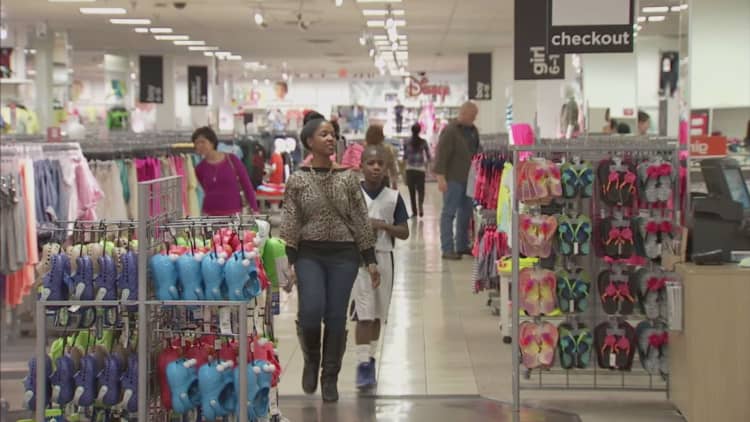
What retail apocalypse? That's what some of America's top commercial real estate CEOs are asking. In fact, they remain some of the retail industry's biggest cheerleaders.
While much of Wall Street is skeptical about retail's future — as evidenced by the less-than-stellar performance of the S&P 500 Retail ETF (), compared to the broader market — there are still some believers around.
A slew of retail real estate investment trusts, or REITs, has reported quarterly earnings in recent days. The list includes , , Taubman and , shopping center landlord , and Sears spinoff Seritage Growth Properties.
Their results have offered a checkup on the health of retail's real estate. And, for the most part, much of these companies' results were positive.
"For the players that own the best assets, things are pretty good," said Floris van Dijkum, an analyst with Boenning & Scattergood. Other retail REITs Acadia Realty, Federal Realty and Regency Centers, which notably only owns grocery-anchored properties, are also reported "decent" results, he said.
"Continued results [from the retail REITs], like what we've just seen, will eventually get people to wake up," he told CNBC. "You have to be somewhat patient."
Many REIT CEOs are saying they've been patient for long enough. They are ready for the narrative to change.
'It will get better'
"Obviously, retail is under more pressure than it has been in the past," Simon CEO David Simon said on a conference call last week. "I do think that our environment is going to get better."
Notably, Simon raised its full-year earnings forecast to $6.20 to $6.28 per diluted share, up 4 cents from a prior estimate the REIT had issued in April. The REIT's stock rallied on the news, though shares of Simon have fallen more than 25 percent over the past 12 months.
Dijkum said Simon's earnings this quarter were "best in class."
"Despite high short interest in the mall sector," this is a company that isn't going to give in to pressure, Dijkum said.
"I think the retail community has been overly negative about the mall product," CEO Simon said on the earnings call. "I don't know why they do it, but we're just going to get up off the mat [and] keep doing what we do. ... This isn't sugar coating."
The retail REIT said that although there are more retail bankruptcies spilling out this year, Simon isn't oblivious to the changes taking place within the industry. Simon is taking steps like reducing exposure to apparel brands and increasing allocation to food services and lifestyle brands to reduce its risk.
Another bonus for the company, e-retailers looking to go physical also appear to be flocking to Simon.
Companies like UNTUCKit, Warby Parker, Bonobos, Fabletics and thredUP, which all got their start online, are now signing deals with Simon, among other REITs.
"They have all realized that having a well-positioned fleet of stores is certainly necessary and optimal for them to grow their business," Simon COO Richard Sokolov said on last week's earnings conference call. "It's going to be a process."
"There is a limit to attracting eyeballs online that [e-retailers] can't get in the physical world," CEO Simon added.
The company is employing other strategies to work with retailers, like offering shorter leases to tenants who are hesitant to lock in a space long term. "It makes sense to do short-term deals if you feel the environment is going to get better," Sokolov said. Retailers looking to test a format in a physical pop-up shop is not a new strategy, but it's one that's just recently gaining even more attention and popularity within the sector.
'The debate is over'
Kimco CEO Conor Flynn is another leading voice of the retail REIT space, and he firmly believes talk of the "retail apocalypse" is exaggerated.
"I think it is fair to say that the debate surrounding the death of physical retail is over," Flynn said in a call with analysts and investors. "The Amazon-Whole Foods transaction, Alibaba's growing grocery concept in China, Wal-Mart's click-and-collect ... program integrated with Jet.com, and Target's flex format Express, all point to a vibrant, albeit different-looking retail real estate world."
Kimco's portfolio today consists of a diverse mix of tenants, such as TJ Maxx, Home Depot, Kohl's Whole Foods and Best Buy.
"Physical retail has a large role to play in this effort to bring the best shopping experience for the customer, especially as retailers continue to explore different ways to overcome the last-mile challenge," Flynn said on the company's earnings call. In fulfilling online orders, the biggest challenge for retailers is often that "last mile," or the distance from a main distribution hub to a customer's home.
"Let's not forget that notwithstanding the changes and challenges that confront retail, off-price, grocery, home improvement, fitness, beauty and other service retailers continue to thrive in this environment," he said.
Kimco's stock has fallen about 35 percent over the past 12 months, including down 20 percent this year. The company is still trying to convince Wall Street that it has the story wrong.
Mall owner Macerich's CEO, Arthur Coppola, echoed similar points on his latest earnings conference call, describing the threats he hears that the "mall is dead" as "very painful."
"There's been a daily, if not sometimes hourly, barrage of headlines predicting the death of great retail locations," Coppola said.
"I share the pain with many of you when you look at those headlines, especially when you have conviction that they are not accurate. ... I have absolutely no empathy for the shorts ... that are motivated, for their own reasons, to help create this fake news."
Macerich affirmed during its latest quarter that it's keeping properties leased and is allocating more square footage to retailers that aren't "boring."
Macerich said it has already added multiplex theaters, for example, to a number of its proprieties as anchors and is looking to do more business with Life Time Fitness chain. The company has even held discussions recently with virtual reality and augmented reality retailers to come into malls.
Making an analogy to baseball, Coppola said as far as digital brands going physical goes, "it is [only] the top of the first inning." He's excited about e-commerce creating a "breeding ground for brands" and bringing in "the next generation of great retailers."
Trading on track with its peers, though, Macerich's stock has fallen 31 percent over the past 12 months, and shares are down 16 percent in 2017.
As REIT analyst Dijkum emphasized to CNBC, it will take time and continued performance by retail real estate investment trusts in order for them to separate themselves from the negative narrative plaguing the industry.
Just last week, mall owner GGP announced it wasn't going to pursue a strategic alternative, like selling itself, and instead will "lease, lease, lease" and "stay the course" in retail. Though this news upset the hedge funds that were hoping the REIT would consider going private, GGP's assets still hold value, Dijkum said. "They're doing all the right things."
If retail was really coming to an end, as some have predicted, GGP likely would be throwing in the towel. Instead, REITs are speaking up and forging ahead.
WATCH: Amazon validates physical retail by acquiring Whole Foods



